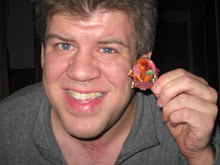Sunday, February 21, 2010
Shutter Island - Take 2
Having seen Shutter Island a second time, I now have a better idea of what to make of it. For me, it is most certainly the first great film of 2010.
The second go-round enriched the experience. This is the Martin Scorsese picture that most richly rewards repeated viewing. More than adding to my understanding of the film, though, the second screening mostly amplified my first impressions.
Even though I knew the key to the film's mystery this time around, that still reinforced the feeling that the story is more of a a mindbender than a heartbreaker. The big emotional wallop that characterizes Scorsese's very best works is just a touch muted here, because the emphasis seems to be more on the puzzle than on the picture the puzzle forms. Perhaps that's endemic to the way Dennis Lehane structured his novel/Laeta Kalogridis structured his screenplay. We're not told much about Teddy's (DiCaprio's) past, so it's hard to find a frame of reference to relate to how his character changed.
Even so, the film is not truly concerned with that sort of empathy. It's more about the conflicting impulses in Teddy's tortured mind, and DiCaprio makes those very vivid indeed. This is one of his very best performances, and that the picture has the emotional gravity it does is due mostly to the actor. I hope the Academy is able to overcome it's short-term memory and remember DiCaprio's wonderfully nuanced work at this time next year.
Also worthy of recognition are two of Scorsese's frequent collaborators, production designer Dante Ferretti and cinematographer Robert Richardson. Ferretti particularly excels at grandiose sets that visualize the past (see Gangs of New York) and his Civil War-era sets are creepily, wonderfully foreboding. Richardson, the greatest American cinematographer, specializes in hypnotic imagery, and his florid colors and flaring of light are hauntingly beautiful.
Their work wonderfully complements the director's many film homages to Alfred Hitchcock, Val Lewton, Samuel Fuller, et al, but the movie is still uniquely Scorsesian in every frame. Watching how he assembles his images and builds and releases tension is nothing less than thrilling.
Not everyone will agree with me. As a scan of the reviews will reveal, Shutter Island can be a very divisive film. It will not give everyone what they expect, and that will cause some to reject it. Their loss. But those attuned to the labyrinth that is Shutter Island will love getting lost in it.
(Note: After my first viewing, on impulse I picked up a copy of the novel at the grocery. I will start reading it now and will blog about that as the mood strikes me.)
Final grade: A
Labels:
Reviews: In theaters
Subscribe to:
Post Comments (Atom)


2 comments:
DiCaprio was good, but Mark Ruffalo was great. I'd read the book before I saw the film, so I watched to see how much "cheating" they did. Ruffalo didn't play a second of his part dishonestly. Watching all the subtle cues he gave that his character wasn't who he seemed to be was absolutely masterful.
Ruffalo was remarkable. I studied him more closely on the second viewing of the film and loved all of the subtle, non-verbal cues his character made toward the other doctors and patients.
Post a Comment